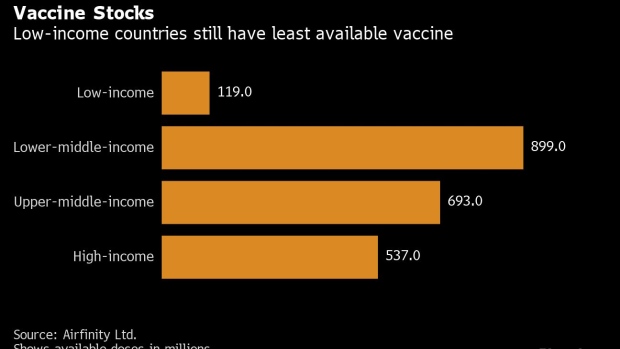Buyers Turn Down Moderna’s Covid Vaccine as Pandemic Demand Wanes
, Bloomberg News

(Bloomberg) -- Two buyers of Covid-19 vaccines for low- and middle-income countries have declined options to purchase hundreds of millions of additional doses from Moderna Inc., a sign of waning demand as the pandemic eases.
The African Union and Covax, the World Health Organization-backed group, decided not to obtain more of the vaccine as developing nations struggle to turn supplies into inoculations. Lower-income countries left behind in the global rollout are now grappling with a lack of funds, hesitancy, supply-chain obstacles and other factors that are hampering distribution.
For months, Moderna’s highly effective messenger RNA vaccine was out of reach for large parts of the world, and the company faced growing pressure to expand access. Now the tables have turned, even as health officials push to boost vaccination rates amid the risk of new variants.
“The vaccine landscape has changed drastically in recent months,” said Safura Abdool Karim, a public-health lawyer and researcher in Johannesburg who’s focused on equity in the pandemic. “We went from really needing vaccines super urgently to now having them.”
While the African Union agreed to purchase 50 million doses for delivery in the first quarter, the body of 55 member states opted not to acquire another 60 million doses in the second quarter, a Moderna spokesperson said in an email.
Covax, meanwhile, turned down two purchase options, one for 166 million doses in the third quarter and a second for 166 million doses in the fourth quarter, Moderna said. Covax remains in discussions with Moderna, according to a spokesperson for one of its key partners, Gavi, the Vaccine Alliance.
Short Shelf Life
The groups decided not to secure the doses despite Africa’s low immunization rate. Only 15% of the continent’s population is fully vaccinated, compared with a global average of 57%, the WHO said last month. About 400 million of the more than 700 million doses Africa has received have been administered.
Enthusiasm turned to hesitancy in some African countries after months of delays, according to Edward Kelley, a former director of health services for the WHO. Donated vaccines arriving with little notice and short shelf lives have made it even harder. The problem highlights how the global effort failed to sufficiently address the delivery challenge, he said.
“The focus was almost exclusively on vaccines, and not on vaccinations,” said Kelley, who is now global health lead at ApiJect Systems Corp., a medical technology company.
With new Covid cases dropping, many African countries are scaling back surveillance and quarantine measures. The WHO is calling for caution, urging countries not to lose sight of the risks of variants and pushing to expand vaccination coverage.
Future Sales
Covid vaccine sales remain relatively brisk. Moderna said it has signed deals for $21 billion in 2022 vaccine sales, up from $19 billion announced in February. But the company’s shares have fallen by about two-thirds from their August peak amid concerns about future sales and ability to develop new products. Moderna fell 0.9% as of 9:48 a.m. in New York.
Lower demand is also expected to hit sales for companies including Pfizer Inc. and AstraZeneca Plc, as well as new entrants like Novavax Inc., and put pressure on manufacturers in countries such as India and Indonesia that invested in vaccine capacity. While more than 9 billion doses could be produced in 2022, demand may decline to a rate of about 2.2 billion to 4.4 billion doses a year in 2023 and beyond, according to London-based analytics firm Airfinity Ltd.
With supplies now outpacing demand and more shots available, governments are taking a stronger stance against the terms that vaccine manufacturers are offering, Abdool Karim said. They’ve also turned increasingly to bilateral deals rather than relying on Covax, she added.
Covax has picked up the pace of deliveries after struggling to get access to shots last year, with shipments rising to more than 1.4 billion doses to 145 countries. In recent months, its focus has shifted to distribution challenges.
“Flexibility is crucial when it comes to options in our portfolio,” Gavi wrote. “We are in conversations with manufacturers as part of our active portfolio management strategy to align with magnitude and timing of country needs.”
Moderna in October announced a deal to make up to 110 million doses of its vaccine available to the African Union, which didn’t respond to a request for comment. Moderna agreed in May to supply Covax with 34 million doses in 2021 and as many as 466 million doses in 2022, then in December said it would make up to 150 million additional doses available.
(Updates with shares in second section)
©2022 Bloomberg L.P.
No comments:
Post a Comment